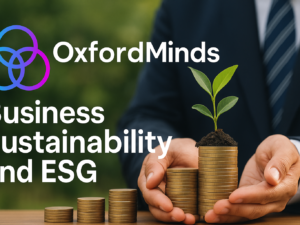- Description
Welcome to the OTHM Level 7 Diploma in Environmental and Sustainability Management, a prestigious, internationally recognized postgraduate qualification designed for professionals who aspire to lead sustainability-driven initiatives in public, private, or non-governmental organizations. As the global focus on climate change, environmental protection, and sustainable development intensifies, the need for skilled leaders who can develop and implement effective sustainability strategies has never been more critical.
This qualification provides a rigorous, comprehensive exploration of the theories, frameworks, and practical tools necessary for addressing today’s environmental challenges. Whether you’re advancing in your current role, pivoting your career towards sustainability, or preparing for doctoral-level research, this diploma serves as an ideal foundation.
Program Structure
The course consists of eight modules, four mandatory and four optional, out of which learners must complete two optional modules alongside all mandatory ones to fulfill the qualification requirements. Each module is designed to build critical thinking, analytical abilities, and practical knowledge necessary for driving sustainable development across diverse sectors.
Mandatory Modules (All Required)
-
Fundamentals of Sustainability
-
Explore the foundational concepts of sustainability, including the triple bottom line (people, planet, profit), Sustainable Development Goals (SDGs), and systems thinking.
-
Understand global environmental issues, ethical considerations, and the business case for sustainability.
-
-
Sustainability and Environmental Management Systems
-
Gain insights into tools such as ISO 14001, life cycle assessment (LCA), and environmental audits.
-
Learn to develop, implement, and manage effective sustainability policies and procedures.
-
-
The Economics of Sustainability
-
Understand the relationship between economics and sustainability, including green finance, circular economy, and cost-benefit analysis of environmental interventions.
-
-
Research Methods
-
Develop research skills essential for academic or professional inquiry.
-
Prepare for your final research project by mastering qualitative and quantitative methodologies, ethical considerations, and literature review techniques.
-
Optional Modules (Choose Any Two)
-
Delivering Transformational Change
-
Focus on organizational leadership, change management strategies, and driving a culture of sustainability within an enterprise.
-
-
Advanced Principles of Net Zero
-
Delve into carbon accounting, greenhouse gas management, decarbonization pathways, and strategies for achieving net zero emissions.
-
-
Environmental Politics and Policies
-
Explore how global and local political structures shape environmental policies.
-
Study key international agreements, stakeholder influences, and environmental justice issues.
-
-
Sustainable Finance
-
Learn about ESG investing, green bonds, impact finance, and the role of the financial sector in achieving sustainability objectives.
-
-
Sustainability as a Business Strategy
-
Understand how to embed sustainability into core business functions, improve stakeholder engagement, and create long-term value.
-
Assessment and Assignment Expectations
Each module is assessed through a written assignment of approximately 3,000 to 4,000 words. Learners are expected to demonstrate:
-
A critical understanding of theoretical frameworks.
-
Application of knowledge to real-world scenarios or case studies.
-
Use of academic research and evidence to support arguments.
-
Clear, structured, and professional writing with proper referencing.
There are no written exams. Instead, the course emphasizes practical understanding and applied knowledge, allowing learners to draw from their workplace experiences and industry insights.
Assignments typically include tasks such as:
-
Policy analysis
-
Case studies
-
Strategic planning proposals
-
Stakeholder engagement models
-
Research essays and literature reviews
These assessments are designed to align with current sustainability challenges, ensuring that you are industry-ready upon completion.
Who Should Enroll?
This program is ideal for:
-
Sustainability officers and environmental managers
-
Professionals in energy, construction, manufacturing, government, and consultancy
-
Business leaders looking to integrate sustainability into operations
-
Graduates seeking a pathway to a master’s or doctoral degree
Pathway to Further Study
Upon successful completion, learners are eligible to progress to a Master’s top-up program (e.g., MBA, MSc) or move directly into doctoral-level study or senior-level professional roles in sustainability management.
Summary
By completing the OTHM Level 7 Diploma in Environmental and Sustainability Management, you will become a leader equipped with the vision, tools, and competencies needed to shape a more sustainable future. With globally relevant content and flexible learning assessments, this qualification empowers you to make a lasting impact in your organization and the world.




